October 4, 2024 · 11 min read
The Future of Project Management: AI in Meeting Management Solutions

Shaimaa Badawi
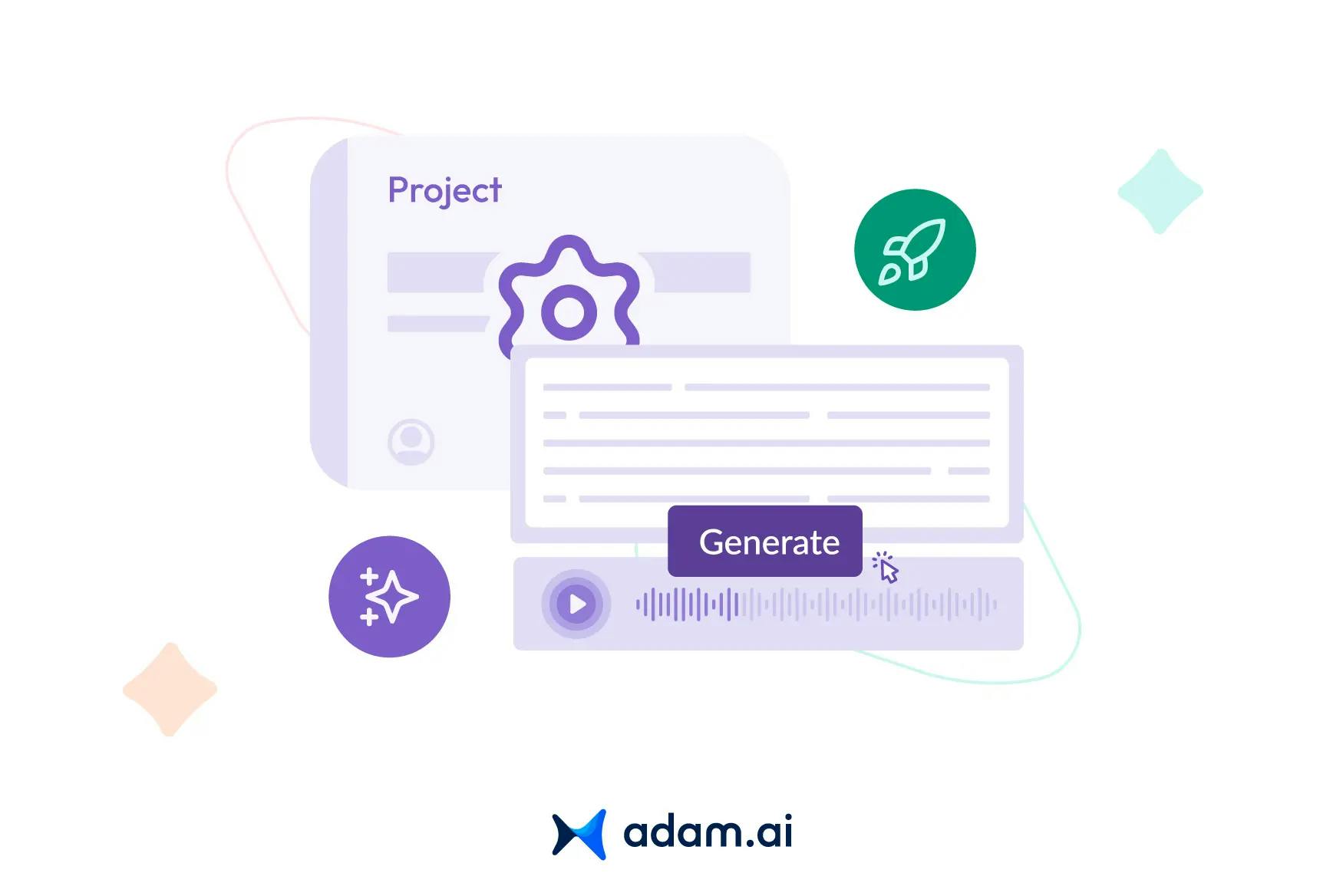
AI is reshaping project management, making meetings smarter, workflows smoother, and decision-making more strategic. In this article, discover how AI-powered meeting solutions drive efficiency, enhance collaboration, and keep projects on track from start to finish.
What role does AI play in shaping the future of project management?
AI is set to redefine project management by enhancing efficiency, improving decision-making, and transforming team collaboration. By automating repetitive tasks, analyzing data in real-time, and generating predictive insights, AI enables project managers to focus on higher-level strategic tasks rather than routine administrative duties. This shift allows for faster project execution, streamlined resource allocation, and more agile responses to challenges as they arise.
In the future, AI’s integration will extend beyond task automation to include predictive analytics and advanced decision-support systems. These systems can anticipate project risks, budgetary concerns, and timeline challenges before they become critical, providing managers with actionable insights. With tools like natural language processing (NLP) and machine learning, AI can analyze communications, assess team sentiment, and suggest optimized workflows, fostering a more cohesive and productive work environment.
Ultimately, AI’s role in project management will evolve toward supporting complex decision-making and long-term strategic alignment. This includes improving cross-functional collaboration and enabling project teams to stay agile in a dynamic business environment. As AI continues to advance, it will empower project managers to deliver greater value to stakeholders, helping organizations meet their strategic goals efficiently and proactively.
How are AI-driven meeting management solutions revolutionizing project workflows?
AI-driven meeting management solutions are revolutionizing project workflows by streamlining meeting processes, enhancing information accessibility, and promoting more effective follow-ups. With capabilities like automated scheduling, agenda creation, and real-time transcription, AI solutions reduce the manual burden on project managers, allowing teams to focus on critical tasks. AI can also automatically capture meeting insights and action items, ensuring that all stakeholders have a clear understanding of next steps, thereby enhancing accountability and reducing miscommunication.
These solutions go a step further by using predictive analytics to optimize workflows. For instance, AI can analyze past meeting patterns, track project progress, and highlight recurring bottlenecks, providing project teams with actionable insights to improve future workflows. Through integrations with other project management tools, AI-driven meeting platforms can update project status, assign tasks, and monitor deadlines directly from within the meeting, eliminating the need for additional follow-up meetings or manual updates.
Furthermore, AI tools that enable cross-functional collaboration ensure that information flows smoothly across departments, breaking down communication silos. This feature is especially valuable for complex projects that require input from multiple teams, as it creates a unified platform where all team members can access relevant discussions and updates.
What are the key benefits of using AI in meeting management for project managers?
AI-powered meeting management solutions offer project managers transformative benefits, from automating routine tasks to enhancing decision-making and accountability.
1. Time-saving automation
AI streamlines routine tasks such as scheduling, setting agendas, and sending reminders, allowing project managers to focus on high-priority activities. This automation also minimizes administrative overhead, freeing up valuable time.
2. Enhanced decision-making
By analyzing meeting data and project insights in real-time, AI provides project managers with actionable recommendations. These data-driven insights support more informed decisions and help managers anticipate and address potential issues proactively.
3. Improved accountability and follow-up
AI captures action items, assigns tasks, and tracks completion, ensuring that no task is overlooked. This automated follow-up keeps all stakeholders aligned and accountable, leading to smoother project progression.
4. Seamless collaboration
AI-driven meeting tools facilitate collaboration across departments by centralizing discussions, documents, and decisions. This integrated approach breaks down silos, enhancing communication and enabling more effective teamwork.
5. Reduced human error
AI minimizes errors in meeting documentation, transcriptions, and scheduling, ensuring information accuracy and consistency. This reliability supports project continuity and reduces the need for repetitive clarification.
6. Real-time transcription and analysis
AI transcribes meetings in real-time, capturing key points and summarizing discussions. This feature is especially valuable for large teams, as it ensures that everyone has access to clear, concise records and summaries.
How can AI improve decision-making and accountability in project meetings?
AI enhances decision-making and accountability in project meetings by providing project managers with data-driven insights, tracking decisions, and maintaining clear records of actions. Here’s how:
1. Data-driven insights
AI analyzes meeting data and previous project trends, enabling managers to make informed decisions based on actionable insights. Predictive analytics highlight potential risks, prioritize tasks, and offer recommendations, making complex decision-making more efficient.
2. Automated meeting summaries and follow-up reports
AI generates comprehensive meeting summaries and follow-up reports, highlighting key decisions, action items, and timelines. This feature ensures that all team members have a clear reference for meeting outcomes, reinforcing accountability and making it easier to track progress on agreed actions.
3. Automated action tracking
AI assigns tasks to individuals, records deadlines, and monitors progress. By following up on these assignments, AI tools keep everyone accountable, ensuring that agreed-upon actions are completed on time.
4. Enhanced visibility of decision-making process
With AI’s detailed logs of discussions and decisions, project managers have a clear record of how decisions were made and who was involved. This transparency not only helps track accountability but also supports consistent, fair project evaluations.
5. Continuous learning and improvement
Over time, AI learns from past decisions and outcomes, refining its recommendations and improving the decision-making process. This continuous feedback loop helps project managers make more effective choices in future meetings.
Why is AI meeting management essential for project managers looking to stay ahead of the curve?
AI meeting management is essential for project managers aiming to stay ahead of the curve because it introduces efficiency, adaptability, and strategic insights that traditional methods can’t match. Here’s why:
1. Strategic focus through reduced workload
By handling administrative meeting tasks autonomously, AI allows project managers to concentrate on big-picture strategy and leadership rather than routine tasks. This shift fosters a proactive approach to project management, enhancing strategic outcomes.
2. Enhanced project intelligence and predictive capabilities
AI uses historical and real-time data to forecast trends and potential bottlenecks, enabling project managers to identify opportunities and mitigate risks before they escalate. This foresight helps in making preemptive adjustments that keep projects on track.
3. Continuous knowledge retention and access
AI meeting tools capture and store meeting insights, decisions, and actions, creating an accessible knowledge base. This continuity ensures that teams have reliable references for decisions, even as members or projects change, thus maintaining consistency across the organization.
4. Accelerated innovation adoption
Adopting AI meeting management keeps project managers aligned with cutting-edge practices, promoting a culture of innovation. This advantage allows project managers to remain agile and responsive to industry trends, positioning their projects at the forefront of technological advancement.
5. Enhanced stakeholder engagement and transparency
AI’s ability to share real-time updates, summaries, and progress reports promotes transparency with stakeholders, building trust and engagement. Stakeholders have clear insights into the project’s direction and can provide timely input, strengthening project alignment with business objectives.
How does AI-driven meeting software support cross-functional collaboration?
AI-driven meeting software supports cross-functional collaboration by creating a unified platform for seamless communication, data sharing, and task management across different teams. Here’s how it enhances collaboration:
1. Centralized knowledge sharing
AI meeting tools organize and store notes, decisions, and action items in one accessible location. This central repository allows teams from different functions to easily access and review relevant information, ensuring everyone stays aligned and informed.
2. Automated task assignments and notifications
AI assigns tasks to team members across departments and sends reminders, ensuring that responsibilities are clear and deadlines are met. This automation reduces the need for manual follow-ups and helps teams stay on track, fostering accountability across functions.
3. Real-time language and communication support
AI-driven tools often include language processing capabilities, enabling real-time translation and summarization of discussions for global teams. This feature ensures that language barriers don’t hinder collaboration, allowing diverse teams to communicate effectively.
4. Integrated project and meeting data
By integrating with other project management tools, AI meeting software can pull in project status updates, relevant documents, and task lists. This integration streamlines workflows, enabling team members from various departments to access project data without switching between platforms.
5. Proactive issue resolution
AI identifies potential bottlenecks or conflicts based on real-time data, alerting teams to address issues before they impact the project. This proactive approach encourages cross-functional teams to collaborate on solutions, maintaining smooth project progress.
How can AI-powered meeting management contribute to a sustainable project environment?
AI-powered meeting management contributes to a sustainable project environment by optimizing resource use, reducing waste, and promoting efficiency. Here’s how:
1. Efficient resource allocation
AI helps allocate resources effectively by analyzing team availability, task priorities, and project needs. This optimization minimizes overuse of resources and reduces the environmental footprint associated with wasted time, effort, and materials.
2. Reduced administrative waste
By automating scheduling, documentation, and follow-ups, AI cuts down on paper use, redundant communications, and unnecessary meetings. This reduction in administrative overhead not only saves time but also reduces waste, supporting a more sustainable approach to project management.
3. Enhanced remote collaboration
AI-powered meeting tools enable seamless virtual collaboration, reducing the need for travel and physical meetings. By facilitating remote work, organizations can minimize the environmental impact of commuting and travel, contributing to a lower carbon footprint.
4. Long-term knowledge retention
AI creates a centralized repository for meeting insights, action items, and project decisions. This continuity reduces the need for repetitive discussions and retraining, conserving resources and maintaining efficiency across project teams.
5. Proactive risk management
AI helps identify potential project risks early, allowing teams to address issues before they escalate. By preventing delays, rework, and resource misallocation, AI supports sustainable project execution that minimizes waste and optimizes outcomes.
6. Improved project lifecycles
AI-powered tools provide insights into project timelines and resource utilization, helping organizations to better manage project lifecycles. This foresight ensures sustainable pacing and prevents burnout, promoting a healthy, long-term project environment.
What’s next for AI in project management and meeting solutions?
The future of AI in project management and meeting solutions is marked by advancements that will further elevate efficiency, decision-making, and adaptability. Here’s what’s on the horizon:
1. Predictive and prescriptive analytics
Beyond analyzing past data, AI will increasingly use predictive analytics to forecast project outcomes, budget needs, and resource availability. Prescriptive analytics will go a step further, offering tailored recommendations for optimal decision-making, allowing project managers to navigate complex scenarios with confidence.
2. AI-driven project ecosystems
AI is set to facilitate fully integrated project ecosystems where multiple tools, platforms, and data sources work together seamlessly. This interoperability will give project managers a unified view of project health, connecting real-time updates, team communications, and resource management in one cohesive system.
3. Advanced virtual assistants
Virtual assistants will evolve to handle more complex tasks, from managing multi-layered project schedules to providing proactive insights based on project milestones. These assistants will become indispensable, guiding project managers through daily tasks, alerts, and strategic decisions with greater autonomy.
4. Emotional intelligence and sentiment analysis
AI will begin to gauge team sentiment and morale through natural language processing, assessing messages, emails, and meeting discussions for tone and engagement levels. This insight will allow project managers to address team dynamics proactively, promoting a positive and productive project environment.
5. Scenario simulations and risk mitigation
AI will enable sophisticated scenario simulations, allowing project managers to explore “what-if” scenarios and test various strategies before implementing changes. These simulations will highlight potential risks, help allocate resources effectively, and reduce the chances of project delays or failures.
6. Increased personalization and adaptability
Future AI meeting solutions will adapt to individual project needs and preferences, learning from each manager’s style to provide personalized insights, summaries, and task recommendations. This adaptability will create a customized experience, making AI an even more intuitive and valuable asset for project teams.
Elevate AI-driven project management with adam.ai
adam.ai is an intuitive meeting management platform for optimizing executive meetings and decision-making across organizations. With iAdam, the AI meeting assistant, adam.ai captures, analyzes, and organizes meeting data in real time, automating tasks, enhancing accountability, and delivering strategic insights to keep projects aligned with business goals.
Here’s how adam.ai and iAdam elevate meeting management.
- Agenda and content management
iAdam captures discussions in real time, linking content items to provide context, ensuring executives are equipped with all relevant insights.
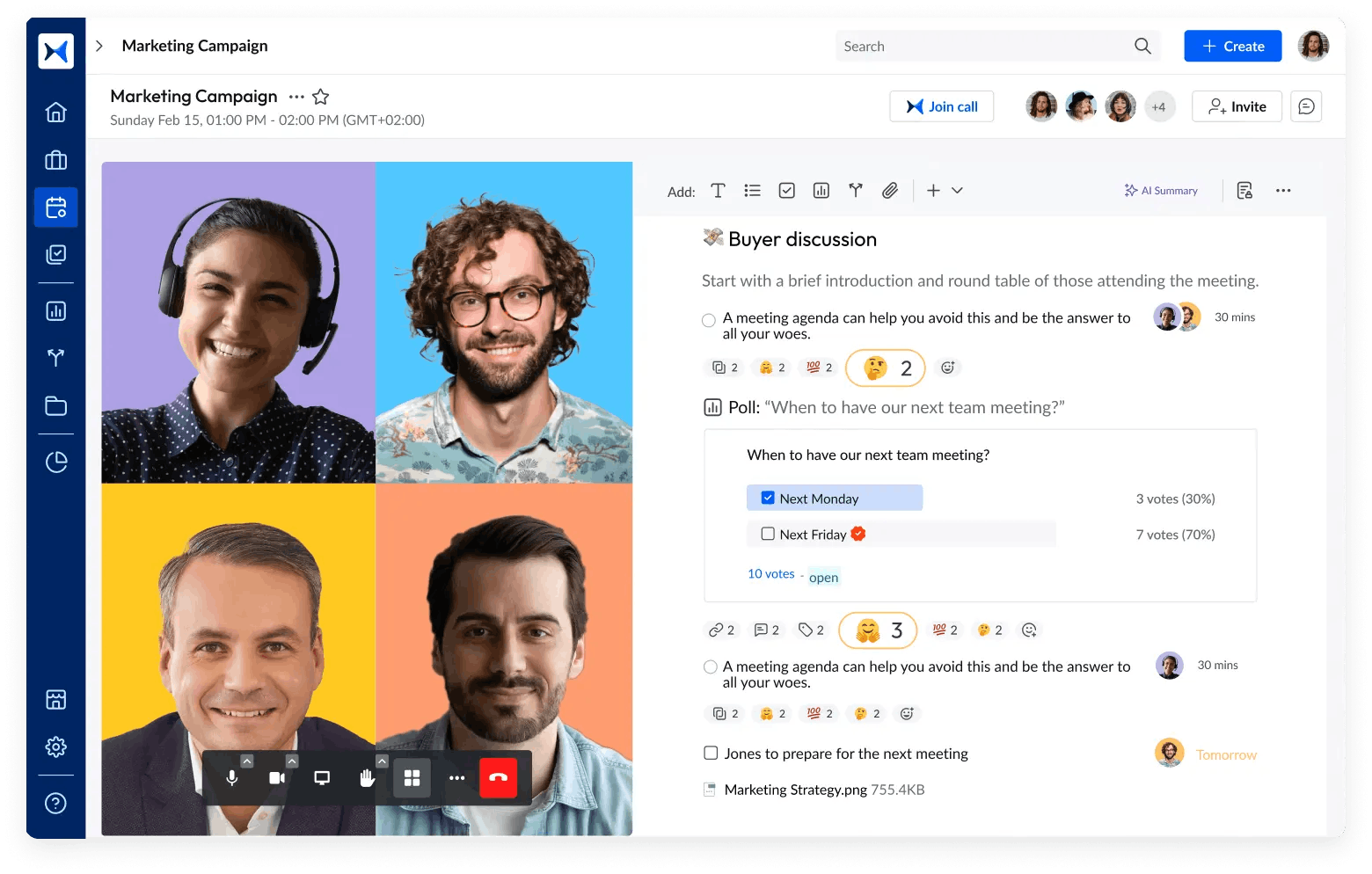
- Action tracking and accountability
iAdam generates action items during meetings, providing clear responsibilities and reminders, keeping projects on course and milestones on track.
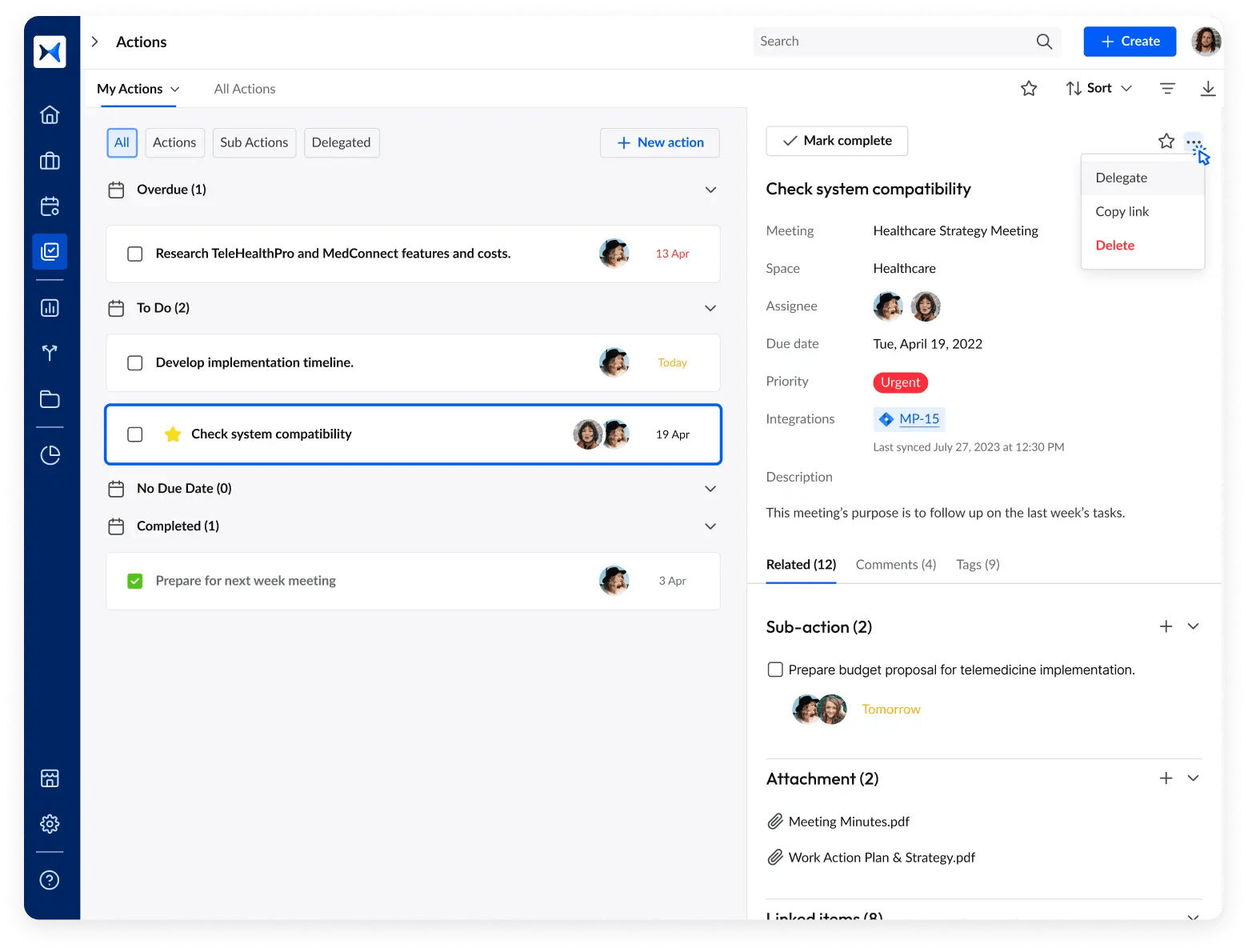
- Multi-space management
iAdam retrieves prior meeting insights across spaces, supporting structured oversight and helping executives manage complex portfolios seamlessly.
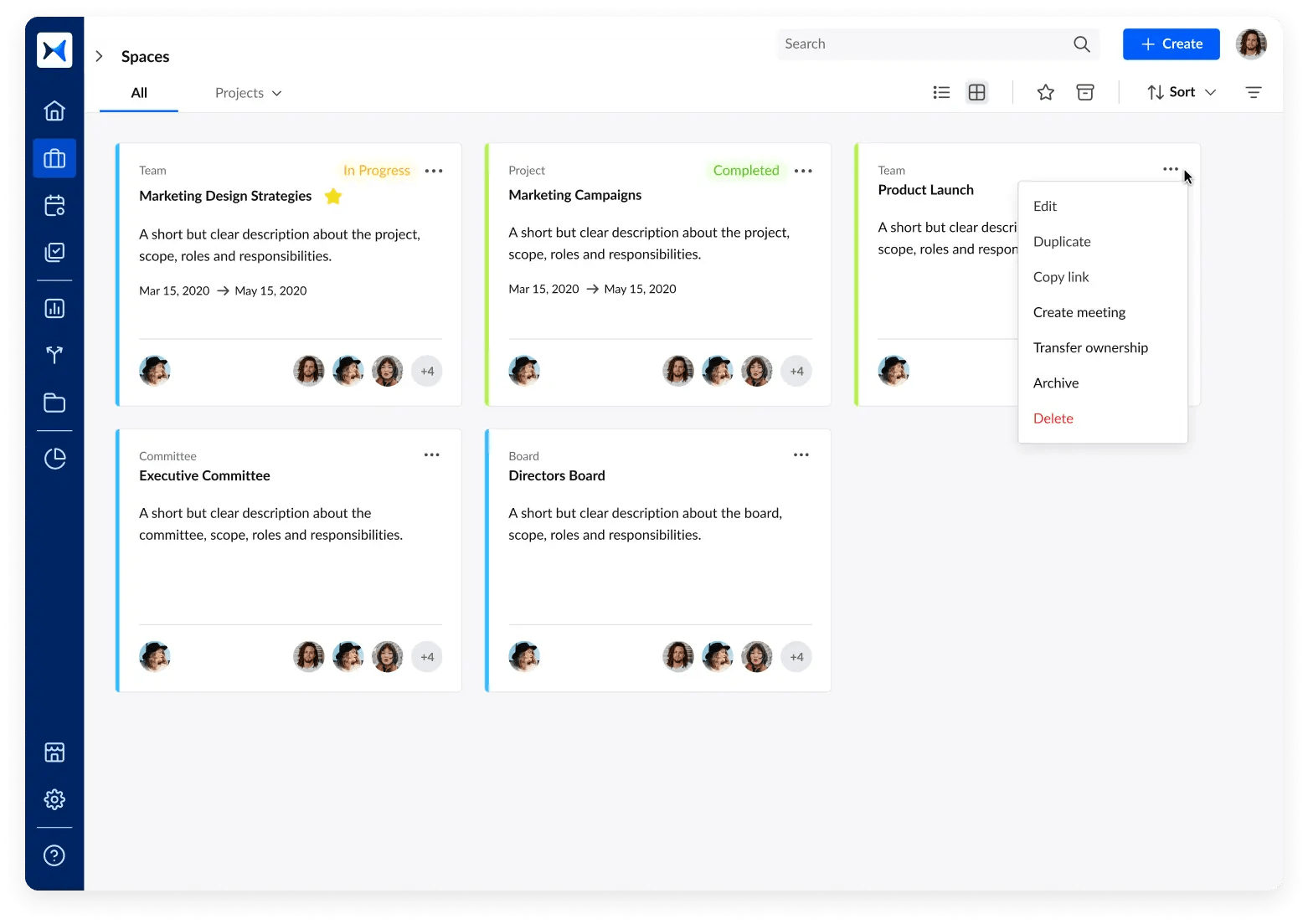
- Automated meeting minutes and documentation
iAdam transcribes recordings, generates smart summaries, and preformats them for quick approval, ensuring accuracy and alignment among stakeholders.
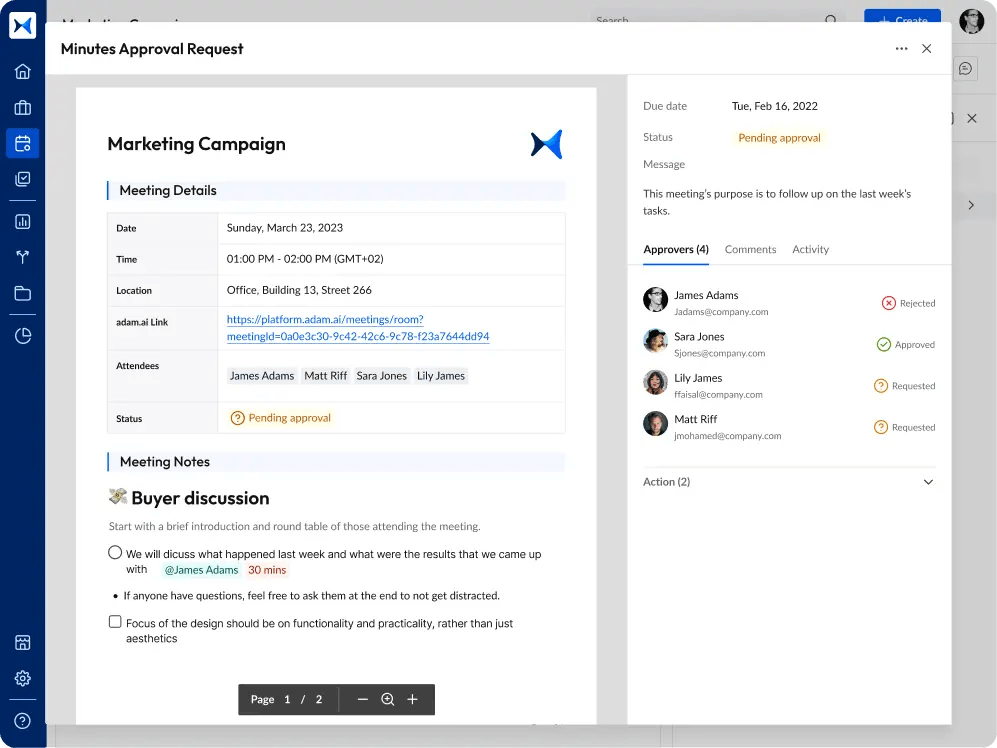
- Voting and decision management
iAdam provides continuity between decisions, helping executives understand the relationships between choices and strategic goals.
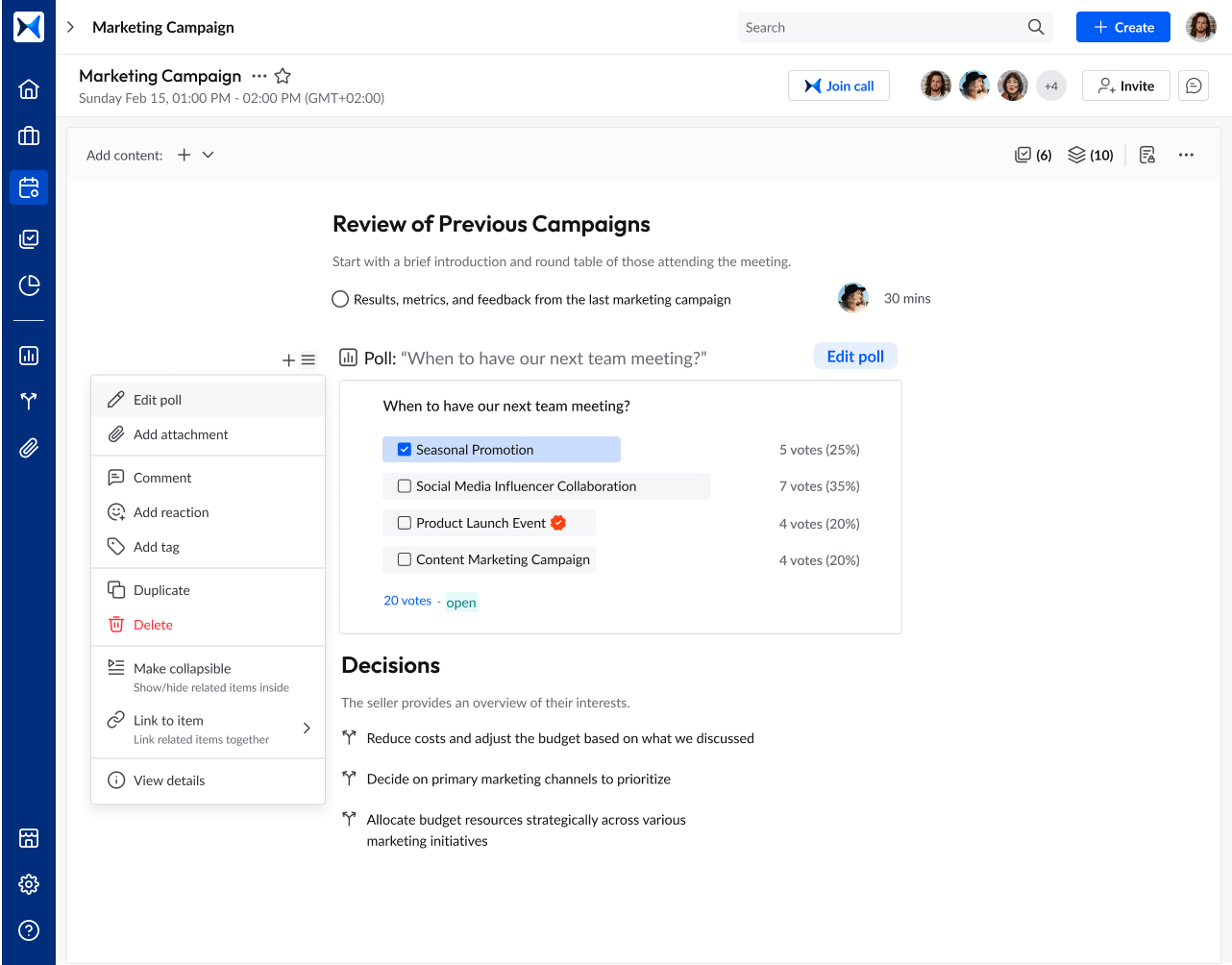
Transform how you conduct critical meetings—From meticulous preparation to effective execution and insightful follow-up, adam.ai integrates comprehensive analytics, full customization, and intuitive interfaces with powerful meeting management tools.
Easy onboarding. Enterprise-grade security. 24/7 dedicated support.
The bottom line
AI meeting management is transforming how projects are planned and executed, creating a more adaptive, efficient, and collaborative environment. AI-powered solutions are essential for organizations looking to enhance productivity, ensure accountability, and make data-driven decisions that drive project success.
And while there may be multiple solutions available, here is why adam.ai is the meeting management software platform you can trust:
- adam.ai is one of Atlassian Ventures' portfolio companies.
- In the meeting management software category on G2, adam.ai has been ranked a leader and a high performer for successive quarters in the past years.
- adam.ai has been included in the Forrester Report in the AI-enabled meeting technology landscape.
- adam.ai is trusted and used by powerful teams and organizations worldwide for all types of critical meetings, like board, committee, project management, and business development meetings.
- And most importantly, adam.ai integrates with your existing workflow, is SOC2 compliant, provides dedicated support and success, and has a free trial option.
Subscribe to adam.ai blog
Stay ahead with the latest insights—get our newest blog posts, tips, and updates sent straight to your inbox.